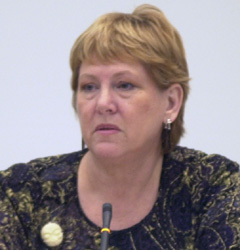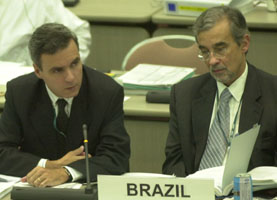Daily Web Coverage (click a day
below)
|
|
International Tropical Timber Council: Thirty-Fifth
Session
| Yokohama, Japan
| 3 - 8 November
2003 |
Highlights from
Thursday, 6 November

On
Thursday morning, delegates to ITTC-35 convened in the Committees
on Economic Information and Market Intelligence (CEM), Forest
Industry (CFI) and Finance and Administration (CFA). In the
afternoon, delegates met in a council session to consider:
the annual review and assessment of the international timber
situation: listing proposals to the Convention on the International
Trade in Endangered Species (CITES); negotiating a successor
agreement to the ITTA, 1994; sustainable forest management
(SFM) in the Congo Basin; and ITTO Objective 2000.
Photo:
Side event on Communities, Forests and Trade: (left to right):
Hildebrando
Ruffier, COICAP, Peru, Yati Bun, Foundation for People and
Community Development, Inc, Papua New Guinea, Alberto Chinchilla,
ACICAFOC, Costa Rica, and Arvind Khare, Independent
Consultant/
|
|
|
|

|
David
Cassells, World Bank, presented findings of a diagnostic
mission to the Philippines, and recommended that the government,
inter alia: develop a comprehensive legislative framework for
SFM; examine trade policy impacts; refine environmental impact
assessments; create regional SFM committees; and provide improved
market information.
(Listen to his presentation).
|
 |
|

|
Stephen
Johnson, Secretariat, presented a report on elements for the annual
review and assessment of the world timber situation (ITTC (XXXV/4),
noting that international timber trade data is increasingly
important since it informs policy discussions. He noted that
since it received a very low amount of country responses on
timber data, it may consider paying countries for such information
in the future.He also said they are also working with an Inter-Secretariat
working group to improve responses from developed countries.
(Listen to his presentation).
Regarding
CITES proposals, he also reported that it had not received
any proposals to list new species in CITES appendices since
ITTC-34. It noted that as of 15 November 2003, mahogany will
be listed under CITES appendix II, implying that each mahogany
import will need a CITES permit. The Secretariat also noted
that CITES and ITTO convened a second meeting of the Mahogany
Working Group, and said ther .
(Listen to his presentation).
|
|
Vice-Chair
Jan McAlpine, said
ITTO is recognized as being one of the more substantive sources
on trade data more generally on timber, and that data is the
basis for policy decisions in the ITTO, as well as on a national
level.
|

|
|
 . .
|
Shaharuddin
Mohamad Ismail
presented a background paper on experiences with the implementation
of the ITTA, 1994 (ITTC XXXV/5), elaborating on: the ITTA's
organization and administration; ITTC procedures; finance; operational
activities; relationships with the Common Fund for Commodities;
and different objectives categories. Ismail concluded that
there have been notable achievements under ITTA, 1994, despite
a shortfall in its implementation. He said that areas for potential
future review under the successor agreement include the integration
of policy and project implementation, balancing project distribition
among committees and among geographic regions, and improving
project cycles.
|
|
Side
event: Communities, Forests and Trade: New Opportunities for
Poverty Reduction and Conservation
|
|
Andy
White, Forest Trends, Chair of the Civil Society Advisory Group
(Far Right), introduced the side-event on Communities, Forests
and Trade: New Opportunities for Poverty Reduction and Conservation."
The panel consisted of four presentations each of which attached
considerable importance to the role forests and community forest
control plays in poverty reduction and enabling sustainable
livelihoods. Hildebrando Ruffner, COICAP, Peru, Yati Bun,
Foundation for People and Community Development, Inc, Papua
New Guinea, Alberto Chinchilla, ACICAFOC, Costa Rica, Arvind
Khare, Independent Consultant, and Chair Andy White, Forest
Trends.
|
Arvind
Khare, Independent Consultant (above left),
provided a comprehensive overview of the trends and developments
in the area of local and community forest ownership. He noted
in particular that community forest ownership has been increasing
in recent years and that this worldwide trend will likely
continue. He also noted that local communities have received
an increasing amount of investment over the last fifteen years.
Khare noted, however, that even as these two trends continue,
there has been a commensurate lack of government support to
facilitate local forest management. (Listen
to his presentation).
Hildebrando
Ruffner, COICAP,
Peru (center), said that industrial forestry is the dominant
form of forestry in Peru and that the involvement of indigenous
people in Peruvian forest management is minimal. Ruffner called
for improved market access for community enterprise and increased
transparency to combat corruption.
Yati
Bun, Foundation
for People and Community Development, PNG
(above right), spoke about community forestry in Papua New
Guinea, noting that community forestry operations face numerous
barriers to entry. Bun said that domestic legislative and
policy reforms are needed to encourage community-based forestry
and that ITTO can help in this regard.
|
| Noting
that most members of the ITTO have signed onto the UN Millennium
Development Goals (MDGs), White said that community forest initiatives
make a strong contribution to poverty reduction and other aspects
of the MDGs. He encouraged community forest initiatives and social
aspects to be integrated into ITTO's work plan, organization and
the successor agreement. WWF BRAZIL elaborated on community initiatives
in the Amazon and encouraged organizations to collaborate and
share experiences of their involvement with forest communities.
NEW ZEALAND emphasized the need for civil society groups to push
governments to open markets and allow forest communities to benefit
from trade. The US asked whether levelling the playing field for
local communities, such as through tax benefits, should occur
only at the national government level, or if it should also occur
at the international community level. |
| Committee on Economic
Information and Market Intelligence and Committee on Forest
Industry |
|
|
Emmanuel
Ze Meka, Secretariat, and Co-Chair Astrid Bergquist. |
|
The
US proposed the addition of two projects to the draft Biennial
Work Programme: a regional workshop in Peru for major mahogany
exporters to assess and build capacities; and a review and audit
of existing tracking systems of producer countries. |
 |
| Committee on
Finance and Administration |
| Informal drafting group: The
informal drafting group made minor revisions to draft decisions
on the executing agencies account and the management of the administrative
budget. The group considered the draft biennial 2004-2005 work
programme, and debated paragraphs listing numerous activities
to be implemented by the Executive Director. |
 |
Members of the Brazilian delegation (left) and with Ana Euler, WWF (right). |
 |
|
|
ENB
writers Andrew Baldwin, Lauren Flejzor, Nienke Beintema, and
Hugh Wilkins (left); Alaister Sarre, of the Secretariat familiarizes
his kids with the Council proceedings from an early age (right).
|
|

